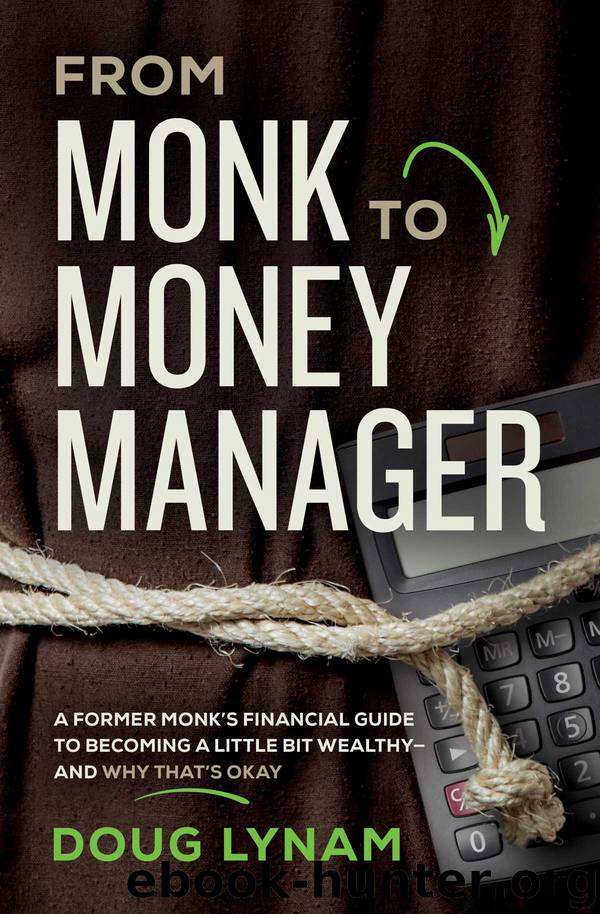From Monk to Money Manager by Doug Lynam

Author:Doug Lynam
Language: eng
Format: epub
Publisher: Thomas Nelson
Published: 2019-02-05T16:00:00+00:00
The Bottom Line: Unpaid Credit Card Debt Makes You Poor
As a math teacher, I would often give students math puzzles or riddles to play with for the first few minutes of class. One of my favorites is this: Imagine you have a circular petri dish for growing bacteria. You place a small sample of magical fast-growing bacteria in the dish, and the bacteria doubles in volume every minute. If you put the first sample of bacteria in the dish at 1:00 p.m., and the petri dish is full at exactly 2:00 p.m., at what time was the dish half full?
Think about it for just a moment before looking up the answer. No, stop. Try again. Anyone can do this; you just need to try. If you are doing crazy calculations or complex math, diagramming a word problem, or counting on your fingers as I do, then you are doing it wrong. If you don’t know, take a break. Make a cup of tea and think for a few minutes. It is a riddle, so the answer must be simple.
Have you got it? Okay, here is a hint. The bacteria doubles in volume every minute. If the dish is full at 2:00 p.m., when was it half full? Got it now? Yes?! The dish is half full one minute before 2:00 p.m.
What does this have to do with debt and investing? Everything. Bacteria grows exponentially. So does money. This is one reason the rich get richer and the poor stay poor. Wealthy people have money that, if invested wisely, grows exponentially. You need to make sure the same is happening for you. The problem is that this exponential growth is most effective over a long period of time. Instead of doubling in volume every minute, like bacteria, money invested at a rate of 10 percent would double every 7.2 years. If your bank account is “full” when you reach $5 million, when will your account be half full? 7.2 years before then. If your account is “full” at age 50, then you were likely halfway to your goal at 42.8 years of age.
But it works in reverse with credit cards! It is the same phenomena when you take on debt, only now you are paying out compound interest and the time value of money is working against you. And at a much higher interest rate. With unpaid credit card debt, you are getting exponentially poorer and poorer, no matter how much money you make.
Wealthy people use the time value of money to their advantage while the poor are taken advantage of. Which side of that game do you want to be on?
Stay out of consumer debt at all costs!
Student loans can be especially devastating. The average college student with a bachelor’s degree graduates with $28,400 of debt. If invested over forty years, that’s $798,914.13 in lost wealth. I’m a fierce advocate for education, but remember that a student loan is just a small business loan in disguise. What is your business
Download
This site does not store any files on its server. We only index and link to content provided by other sites. Please contact the content providers to delete copyright contents if any and email us, we'll remove relevant links or contents immediately.
The 5 Love Languages: The Secret to Love That Lasts by Gary Chapman(9175)
The Space Between by Michelle L. Teichman(6543)
Assassin’s Fate by Robin Hobb(5820)
Wiseguy by Nicholas Pileggi(5284)
Everything Happens for a Reason by Kate Bowler(4451)
Gerald's Game by Stephen King(4346)
Pillow Thoughts by Courtney Peppernell(3976)
A Simplified Life by Emily Ley(3945)
The Power of Positive Thinking by Norman Vincent Peale(3826)
Resisting Happiness by Matthew Kelly(3178)
Girl, Wash Your Face by Rachel Hollis(3097)
Harry Potter and the Prisoner of Azkaban (Book 3) by J. K. Rowling(3084)
Being Aware of Being Aware by Rupert Spira(3056)
Real Sex by Lauren F. Winner(2831)
The Code Book by Simon Singh(2827)
Name Book, The: Over 10,000 Names--Their Meanings, Origins, and Spiritual Significance by Astoria Dorothy(2822)
More Language of Letting Go: 366 New Daily Meditations by Melody Beattie(2815)
The Holy Spirit by Billy Graham(2743)
Victory over the Darkness by Neil T. Anderson(2709)
